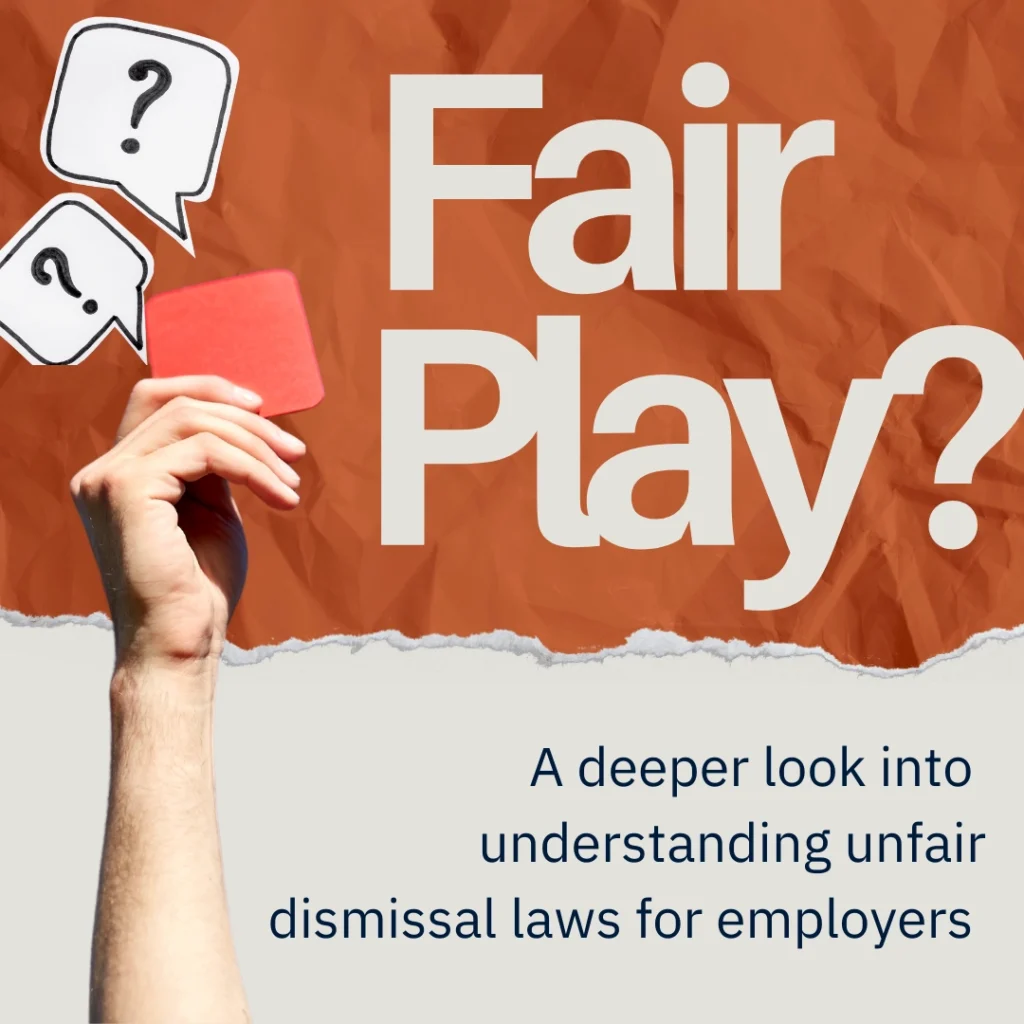Navigating the complex landscape of workplace rights in Australia can be daunting. Unfair dismissal is a topic that often comes to the fore, provoking anxiety and confusion among both employers and employees.
So, let’s break it down. Through this unfair blog series, we’re aiming to demystify unfair dismissals, why they are complicated, and what steps you can take – as an employer or as an employee– to manage any related challenges.
What is Unfair Dismissal?
Simply put, unfair dismissal happens when an employee is let go from their job in a way that’s considered unfair.
Under the Fair Work Act 2009 (Cth) (Fair Work Act), it’s considered unfair if an employer terminates an employee in a way that is harsh, unjust, or unreasonable, lacks a valid reason connected to the employee’s performance or conduct, or is not procedurally fair.
Why does it exist? Unfair dismissal protections are designed to protect employees from wrongful termination, but they also help provide employers with a clear framework for lawful employee dismissal.
For Employers:
Dealing with an unfair dismissal or ‘adverse action’ claim, requires a delicate and informed approach. Ideally, you’ll want to settle these issues before they escalate to the Fair Work Commission. Having expert advocates can be a game-changer if things do reach that stage. Legally trained professionals (like us!) can help you manage the implications of the claim, minimise costs, and reduce stress.
As an employer, it’s crucial that you keep your disciplinary procedures crystal clear and consistently applied. This not only helps in defending against any claims but also keeps litigation risks at bay.
It Gets Trickier if You’re a Small Business…
For small to medium sized businesses, handling unfair dismissal claims can be especially tough. Without specialised HR personnel, small businesses may struggle with the complexities of employment laws, leading to procedural errors in handling dismissals. The informal nature of many small workplaces also means that standardised policies for disciplinary actions and terminations are often lacking, increasing the risk of inconsistent and unfairly perceived practices. Additionally, the costs associated with legal defence or consultancy can be prohibitive, forcing small business owners to attempt to manage these issues internally, sometimes with inadequate experience.
The personal connections in smaller teams can also make dismissals emotionally charged and possibly biased. An unfair dismissal claim can really shake up a business’ reputation and team dynamics, and this is something that hits smaller companies particularly hard. To counter these challenges, it’s wise for small to medium sized businesses to set clear employment guidelines, seek periodic legal advice, and train managers in proper HR practices to ensure law compliance and fair employee treatment.
So let’s illustrate how it can get complicated with an hypothetical scenario. The following details might be fictional but they’re based on our experience working with a wide array of clients – so it’s not far from reality:
Imagine you run a medium-sized business. One of your senior employees, let’s call him Alex, has been underperforming for several months. Despite multiple informal warnings, there’s been no improvement in Alex’s work quality. Frustrated, you decide to terminate his employment due to poor performance.
Here’s where it can get complicated: Alex then files an unfair dismissal claim with the Fair Work Commission, arguing that he was never formally warned about his performance issues nor given a fair chance to improve, claiming that all discussions were informal and not documented. As an employer you now have to contend with the following:
- Were no conversations and warnings regarding Alex’s performance documented? If so, what informal evidence might exist (e.g., emails, witness accounts)?
- Is there a clear and consistent performance evaluation process in place that was followed in Alex’s case? How is this process communicated to employees?
- Was Alex provided with a formal opportunity to improve his performance (i.e. with a performance improvement plan or something similar?) If so, what were the specific expectations and timelines outlined?
- How have similar performance issues been handled with other employees? Is there a pattern of inconsistency that could appear biased or unfair?
- Does the termination align with both the internal policies of the company and the legal standards set by the Fair Work Act?
- How clear was the feedback given to Alex about his performance issues?
- Can you adequately demonstrate that Alex’s performance was not only below expectations but also that it reasonably justified termination?
- Did you consult legal or HR experts before deciding to fire Alex to make sure all procedural bases were covered?
- What are the potential impacts of Alex’s dismissal on the team and the company?
This isn’t an exhaustive list of considerations – likely just the tip of the iceberg. This scenario underscores the importance of procedural fairness in particular. Even if Alex was underperforming, the absence of formal performance reviews and documented warnings can be viewed as unfair by the Commission. As an employer, it’s vital that you follow a documented process for managing performance issues, including formal warnings and chances for improvement, to safeguard your business against unfair dismissal claims.
What Makes Unfair Dismissals so Complicated?
Unfair dismissals are inherently complex due to the multitude of factors involved in each case. Figuring out if a dismissal is unfair involves looking at the reasonableness of the dismissal reason, the processes the employer followed, and whether the employee was given a chance to mend their conduct or performance. Additionally, both parties must wade through the detailed legal frameworks and procedural timelines of the Fair Work Commission, which can be overwhelming and resource-intensive.
We’ve already given you a hypothetical situation for consideration, so here’s a real case study that helps to highlight the intricacies of unfair dismissal claims:
Tomaso Edwards Moro v Insider Au Pty Ltd [2023]
What happened:
In August 2023, the employee, Tomaso Edwards Moro, was nudged by his employer during a phone call to resign, following his failure to come into the office for work on a mandatory office day.
During this phone call, the employer had hinted that his employment would end the next day. Moro didn’t agree to resign but was open to termination if compensated for the notice period as per his contract. The dismissal was finalised in September, and he was notified that he’d get two weeks’ salary in lieu of the eight-week notice his contract stipulated.
Moro argued that he was a top performer, having won multiple awards for performance, and claimed his firing lacked a valid reason and wasn’t done fairly. He hadn’t been warned about performance or conduct issues, nor was he allowed a support person during the termination talk.
On the employer’s end, they pointed to performance issues, behavioural problems, and attendance concerns as reasons for the firing. These included unexplained absences and poor responses when addressed. HR had noted these ongoing issues, which led to the decision to let Moro go. The employer insisted that Moro knew what was expected performance-wise and had been informally advised about these issues before the firing.
What did the Fair Work Commission consider:
In evaluating the fairness of the dismissal, the Commission considered several statutory factors.
Valid Reason for Dismissal: The Commission found no valid dismissal reason related to Moro’s capacity or behaviour. Despite the employer’s claims, evidence backed Moro’s competence and the Commission questioned the conduct-related reasons, especially his choice to work from home on certain days.
Notification of Reason: Moro was not properly notified of the reasons for his potential dismissal, which breached the requirements for fair notice.
Opportunity to Respond: Moro wasn’t given a chance to address the dismissal reasons, with termination talks happening without any opportunity for him to respond or have a support person by his side. The employer also unreasonably refused to let Moro have a support person during the dismissal discussions, which was seen as procedurally unfair.
Performance Warnings: Moro hadn’t been warned about unsatisfactory performance prior to his firing, contradicting the employer’s later performance issue claims.
Other relevant considerations: The Commission considered additional factors such as the lack of experience in legal proceedings by representatives of both parties, and the overall context of Moro’s expected resignation and subsequent reversal, which seemed to influence the employer’s decision to dismiss.
Outcome:
The Commission decided in favour of Moro, concluding that the dismissal lacked a valid reason, was procedurally unfair, and did not comply with the terms of the employment contract regarding notice period, ultimately ruling the dismissal as harsh, unjust, and unreasonable.
The employer was ordered to pay a compensation amounting to 12 weeks’ salary.
Key Takeaways:
- The case underlines the importance of adhering to employment contracts, particularly regarding notice periods. Employers must follow contractual terms unless legally altered otherwise.
- Employers also need to ensure procedural fairness in dismissal processes. This includes giving valid reasons for dismissal, proper notification, and the chance for the employee to respond, ideally with a representative if desired.
- Clear communication and proper documentation are essential! Employers should always maintain records of any discussions and decisions related to employment conditions and potential terminations.
- The notes from the Commission also stress the necessity for employers, especially those operating in multiple jurisdictions, to understand and comply with local employment laws to avoid legal pitfalls and ensure fair treatment of employees.
- The dispute was borne out of dissatisfaction with the way Moro had handled his absence on that one mandated office day. The employer claimed that it was ‘last minute’, with them having to ‘chase up’ Moro to explain his absence, along with an alleged history of attendance concerns. So there an important discussion point that arises here about how you communicate employee expectations (whether it be for behaviour or performance aspects), as well as the importance for laying out clear policies and procedures for expected employee behaviour.
Navigating Unfair Dismissals … with Some Help!
Dealing with unfair dismissals and adverse action claims is undoubtedly time-consuming and technical. For employers, partnering with specialised advocates who can handle the paperwork and represent your interests allows you to remain focused on running your business. For employees, having a knowledgeable advocate on your side means that your rights are defended and that you stand the best chance of a favourable outcome.
If you find yourself facing an unfair dismissal claim, whether as an employer or an employee, do not hesitate to seek professional help. For specialised advocacy that can protect your interests and guide you through the complexities of the process, contacting experienced consultants can make all the difference.
Our employment consultants at Workplace Wizards can assist in assessing your employment case and determining the appropriate unfair dismissal remedy for you.
We can help you if you are a company owner or manager, providing guidance on unlawful termination law and ensuring that you are compliant with your legal responsibilities. We can also assist you if you need to defend a claim of unfair dismissal and provide you with comprehensive legal support throughout the process.




Comments are closed.